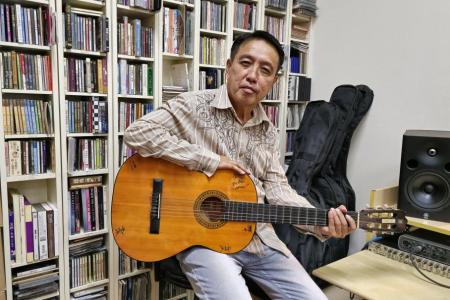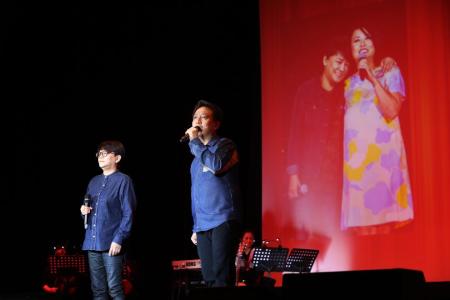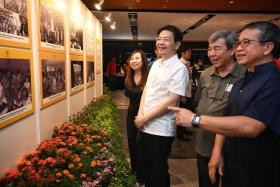From selling his HDB flat to sell-out show at Indoor Stadium
This National Day, TNP showcases not-so-ordinary Singaporeans who chart success their own way
CAI YIREN, 59
TCR Music Station founder
He is the unsung hero of the xinyao scene, so much that he continues to write the history of the music, bringing the old and young together in an annual outing that sees sell-out tickets, whether it is for 5,000 or 8,000.
Last month, tickets to Xinyao 42nd Reunion Concert held at Singapore Indoor Stadium were sold out in two days. It was the second time Cai pulled off the stint – the first was in 2018.
Xinyao is a term that refers to young Singaporeans (新加坡人) creating their own songs (歌谣).
Cai's first contact with xinyao was in Jurong Junior College, where singer Eric Moo and group Subway Band held performances.
Ask if he ever envisioned this success in 1998, he'd unabashedly tell you: No.
But he acknowledged the strongest pillar of support is Shirley Wong, his wife of 30 years, who allowed him to pursue his dream.
Tell us a little bit about yourself and what you do. What drew you to this path?
When I was in NS in 1986, eight other former schoolmates and I banded together to participate in the first national xinyao songwriting and singing competition. That was also when I met Shirley, who was with another group.
In 1988, I went to Taiwan where Chinese folk music cafes were flourishing. I loved the vibes of live music, which was very similar to xinyao. I returned home with a big dream of opening my own cafe.
I found a place in Chinatown, paid a deposit of $13,500 and started applying for licences and preparing for renovations. Then I was told, sorry, our application for an entertainment licence was rejected because the area had too many security issues with frequent robberies.
My dream of starting Singapore's first folk music cafe was shattered and I was heartbroken. I worked all kinds of other jobs, from sales to marketing that were unrelated to music, but that dream was always there.
In 1998, I decided to go for broke – it was make it or fail. We borrowed $100,000 from relatives and friends to set up TCR (Tan Chang Ren, Chinese for someone who plays the guitar and sings).
At that time, we'd just got a five-room HDB flat in Pasir Ris which I used as a collateral. I told my creditors that if I failed, I'd sell it after five years.
Shirley was pregnant and gave birth to our first daughter shortly after.
My wife and I both worked day jobs and ran the cafe at night. It was exhausting and the money we made wasn't enough, so I had to borrow more, pouring it into losses.
Two years later, I decided to quit. Luckily, the landlord was kind – there was a year left on the lease, and he could have confiscated three months' rent and the deposit – but he said, "I know you've worked hard, it just isn't working out." We saved $10,000 on rent and he even returned my $5,000 deposit. But I kept my word and we sold the flat to pay off all debts.
We pivoted to organising small-scale concerts and that was the turning point. In 2002, I organised the first Chong Feng (Reunion) show, which featured an ensemble of popular Taiwan and xinyao singers.
We made losses for the first two years but I refused to give up, I believed we would eventually succeed. I'd like to believe we have made it.
What's the biggest challenge you face in your day-to-day work?
Having to deal with naysaysers who accuse of rehashing old songs and not passing on the legacy. Others say I'm trying to commercialise culture.
The annual National Schools Xinyao Singing and Song Writing Competition, launched in 2015, has breathed a new life into this genre.
But before that, we were performing in schools for students. No one knew because we didn't publicise it, so the accusations are unfair.
Now that we've organised the competition for 10 years, the performances speak for themselves. Despite criticisms, we have been committed to passing on the legacy.
It's human nature; some early xinyao enthusiasts may not have been involved or felt slighted that we didn't include them due to various reasons and that leads to their dissatisfaction.
What's the most rewarding aspect of your work?
Meeting so many friends through music. Enjoying music, being able to perform, is a blessing. It's fulfilling to share the beauty of music with others, creating lasting memories and bond.
How do you see your work contributing to the Singapore landscape?
I wouldn't call it a contribution, but we've documented our experiences and emotions through music, reflecting Singapore's unique culture.
Our concerts resonate with many, reminding them of shared history and experiences – it could be a part of them growing up, going to school, falling in love and setting up a family.
This emotional connection is invaluable.
What's a favourite Singapore memory you cherish?
Growing up in a kampung. It was a time of simplicity and close-knit community bonds.
We played barefoot, enjoyed nature and trusted our neighbors - you didn’t have to lock your doors and gates. Those were the best years, a stark contrast to today’s complexities.
What’s your favourite Singapore dish?
Hard to pick just one! Fishball noodles, chicken rice and curry fish head. These dishes are quintessentially Singaporean and hold a special place in my heart.
What makes you the proudest about being Singaporean?
We have a strong sense of national identity, and our society is very warm-hearted. You often see media reports about people in need and many stepping up to help. These are qualities I think are characteristic and precious in Singaporeans.
What is your hope for Singapore?
Our country is so small, we have to remain united or we can fall apart easily.
I also hope the younger generation learn to be good people, even as they excel academically, this way they don’t become a generation that can only work but lack empathy.
May they have a solid foundation in traditional values, so they don't become a generation that knows only how to work but not how to be good people.
Get The New Paper on your phone with the free TNP app. Download from the Apple App Store or Google Play Store now






